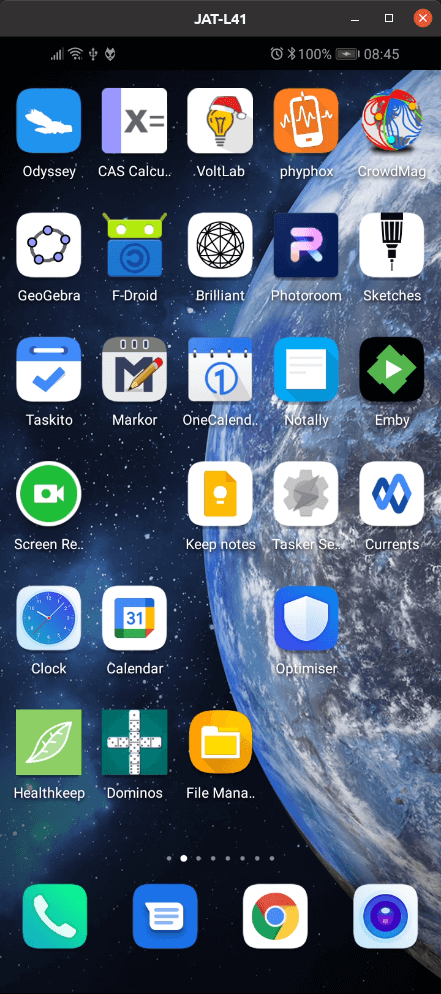Last Updated on July 12, 2022
In Operation
Before you can access an Android device, there’s some configuration to do.
You’ll need to enable USB debugging from the Developer options screen. On Android the options screen is hidden by default, but it can be enabled from Settings > About phone by tapping Build number seven times.
You don’t need to have rooted the Android device. The software uses ADB to communicate with the Android device via USB. It’s also possible to access a device over TCP/IP over port 5555, with the commands:
$ adb tcpip 5555
$ adb connect IP_address_of_Android_device:5555
Then restart scrcpy.
Once you’ve performed the simple configuration step, you’re ready to start scrcpy. Here’s an image showing the program in action. The software displays only the device screen.

We found that performance is very good, but this is dependent on the hardware you’re using.
If you do have performance issues, there’s various steps you can take to resolve the problem. These include the ability to reduce the resolution, change the bit-rate as well as reducing the maximum frame rate. It’s best to decrease the bit-rate when running over TCP/IP ($ scrcpy --bit-rate 2M ).
It’s also possible to mirror only part of the screen. By default the software encodes video at 8 MBps. The program always renders the last available decoded frame and drops any previous ones, but it’s also possible to render all frames although this may affect latency.
We like the ability to record the screen in both mp4 and mkv formats. With the record option enabled, there’s also the option not to display the device.
From extensive testing, mirroring works particularly well. There’s also the ability to turn off the device screen when mirroring although this isn’t implemented particularly well.
There’s also a good range of keyboard shortcuts that let you resize windows, switch to full size mode, perform actions like middle clicks, change the volume, rotate the device, copy and paste the device/computer clipboard, and more.
Pages in this article:
Page 1 – Introduction / Installation
Page 2 – In Operation
Page 3 – Summary
Complete list of articles in this series:
| Excellent Utilities | |
|---|---|
| AES Crypt | Encrypt files using the Advanced Encryption Standard |
| Ananicy | Shell daemon created to manage processes’ IO and CPU priorities |
| broot | Next gen tree explorer and customizable launcher |
| Cerebro | Fast application launcher |
| cheat.sh | Community driven unified cheat sheet |
| CopyQ | Advanced clipboard manager |
| croc | Securely transfer files and folders from the command-line |
| Deskreen | Live streaming your desktop to a web browser |
| duf | Disk usage utility with more polished presentation than the classic df |
| eza | A turbo-charged alternative to the venerable ls command |
| Extension Manager | Browse, install and manage GNOME Shell Extensions |
| fd | Wonderful alternative to the venerable find |
| fkill | Kill processes quick and easy |
| fontpreview | Quickly search and preview fonts |
| horcrux | File splitter with encryption and redundancy |
| Kooha | Simple screen recorder |
| KOReader | Document viewer for a wide variety of file formats |
| Imagine | A simple yet effective image optimization tool |
| LanguageTool | Style and grammar checker for 30+ languages |
| Liquid Prompt | Adaptive prompt for Bash & Zsh |
| lnav | Advanced log file viewer for the small-scale; great for troubleshooting |
| lsd | Like exa, lsd is a turbo-charged alternative to ls |
| Mark Text | Simple and elegant Markdown editor |
| McFly | Navigate through your bash shell history |
| mdless | Formatted and highlighted view of Markdown files |
| navi | Interactive cheatsheet tool |
| noti | Monitors a command or process and triggers a notification |
| Nushell | Flexible cross-platform shell with a modern feel |
| nvitop | GPU process management for NVIDIA graphics cards |
| OCRmyPDF | Add OCR text layer to scanned PDFs |
| Oh My Zsh | Framework to manage your Zsh configuration |
| Paperwork | Designed to simplify the management of your paperwork |
| pastel | Generate, analyze, convert and manipulate colors |
| PDF Mix Tool | Perform common editing operations on PDF files |
| peco | Simple interactive filtering tool that's remarkably useful |
| ripgrep | Recursively search directories for a regex pattern |
| Rnote | Sketch and take handwritten notes |
| scrcpy | Display and control Android devices |
| Sticky | Simulates the traditional “sticky note” style stationery on your desktop |
| tldr | Simplified and community-driven man pages |
| tmux | A terminal multiplexer that offers a massive boost to your workflow |
| Tusk | An unofficial Evernote client with bags of potential |
| Ulauncher | Sublime application launcher |
| Watson | Track the time spent on projects |
| Whoogle Search | Self-hosted and privacy-focused metasearch engine |
| Zellij | Terminal workspace with batteries included |
